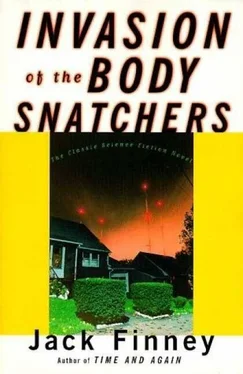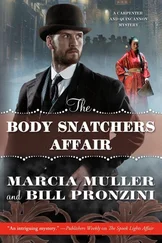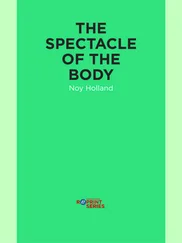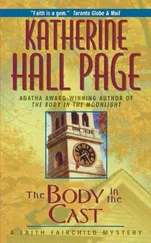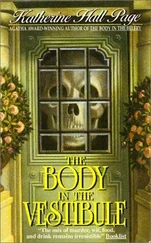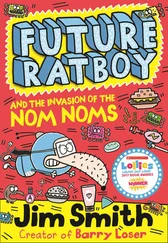"Yes," he said, and smiled pleasantly. He wore steel-rimmed glasses, had brownish, slightly wavy hair, and the kind of intelligent, interested, young-looking face that teachers so often seem to have.
"I'm Miles Bennell, Doctor Bennell, and – "
"Oh, yes." He nodded, smiling. "I've seen you around town, and – "
"I've seen you, too," I said. "I knew you were with the College, but didn't know your name. This is Miss Becky Driscoll."
"How do you do." He opened the door wider, and stood to one side. "Come in, won't you?"
He led us in, then took us along a hall to a sort of study. He had an old-fashioned roll-top desk in there, some books in a hanging wall shelf, framed diplomas and photographs on the wall, a rug on the floor, and a battered old couch along one wall. It was a small room, with only one window, and rather dark. But the desk lamp was on, and the room had a sheltered, pleasant feeling; I imagined he spent a lot of time in it, working. Becky and I sat down on the couch, Budlong took the swivel desk chair, and swung part way around to face us. Again he smiled, a kind of friendly boyish smile. "What can I do for you?"
I told him. For reasons too long and complicated to explain, I said, we were very interested in anything he could tell us about a newspaper story in which he'd been quoted, though we hadn't seen the story, but only a reference to it in the Tribune.
He was grinning by the time I was finished, shaking his head in a sort of rueful amusement at himself. "That thing," he said. "I guess I'll never hear the end of it. Well" – he leaned back, slouching down to rest his neck on the back of his chair – "it was my own fault, so I shouldn't complain. What do you want to know, what the story said?"
"Yes," I answered. "And anything else you can add."
"Well," – he shrugged a shoulder – "the story said some things it shouldn't have." He smiled again, at himself. "Newspaper reporters," he said ruefully. "I guess I've lived a sheltered life; I never met one before. This one, this young man, Beekey – he's an intelligent boy – phoned me one morning. I was professor of botany and biology, was I not? I said yes, and he asked if I'd drive out to the Parnell farm; he told me where it was, and it wasn't far from here. There was something I ought to see, he said, and he described what it was in just enough detail to arouse my curiosity."
Professor Budlong brought his hands together over his chest, the finger tips of one hand touching the tips of the other, and it occurred to me that professors must get so they unconsciously act the way people think professors ought to act; and I wondered if doctors did, too.
"So I drove out to the farm, and on a trash pile next to the barn, Parnell showed me some large hulls, or pods of some sort, apparently vegetable in origin. Beekey asked me what they were, and I told him the truth, that I didn't know. Well" – Budlong smiled – "he raised his brows at that, as though he was surprised, and since I have my professional pride, it stung me into saying that no botanist alive could identify absolutely anything shown to him. 'Botanist', young Beekey repeated. Did that mean I thought they were some sort of plant life? And I said yes, I thought they probably were." Budlong shook his head admiringly. "Oh, they're clever, these reporters; they have you making some sort of comment before you quite realize it. Cigarette?" He took a pack from the breast pocket of his coat, and offered Becky one, then me, and we each took one. So did he, and I held a match for us all.
"The things he showed me" – Professor Budlong exhaled cigarette smoke – "simply looked to me like very large seed pods, as they'd have looked to anyone, I'm sure. The farmer, Mr. Parnell, told me they'd come drifting down from the sky, which I didn't doubt – where else would they come from? – though Parnell seemed amazed. They didn't seem at all remarkable to me, except possibly for their size. Some sort of seed pod was all I could say, though I admitted that the substance they were filled with did not resemble what we ordinarily think of as seeds. Beekey tried to interest me in the fact that several objects in the trash pile on which the pods had fallen seemed very much alike, attributing this fact to the pods. He pointed out two empty Del Monte peach cans, I remember, which looked identical. There was a broken axe handle, and another similar one beside it. But I couldn't, myself, see anything very startling about that. Then he tried another tack; he wanted a story, you see, a sensational one, if possible, and was determined to get it."
Budlong drew on his cigarette, smiling at us. "Could these things have come, he now wanted to know, from 'outer space', as he phrased it. Well" – Budlong shrugged – "I could only answer yes, they could have; I simply didn't know where they'd come from. You see" – Professor Budlong sat up in his chair, and leaned forward toward us, forearms on his knees – "this is where young Beekey trapped me. The theory, the notion, whatever you want to call it, that some of our plant life drifted onto this planet from space, is hoary with age. It's a perfectly respectable, reputable theory, and there is nothing sensational or even startling about it. Lord Kelvin – you undoubtedly know this, Doctor – Lord Kelvin, one of the great scientists of modern times, was one of many adherents to this theory, or possibility. Perhaps no life at all began on this planet, he said, but it drifted here through the depths of space. Some spores, he pointed out, have enormous resistance to extremes of cold; and they may have been propelled into the earth's orbit by light pressure. Any student of the subject is familiar with the theory, and there are arguments for and against it.
"So, 'Yes', I said to the reporter; these could be spores from 'outer space'; why not? I simply didn't know. Well, this seemed astonishing news to my reporter friend, and he joined two of my words as a single phrase. 'Space spores', he said in a pleased tone, and wrote the phrase on a scrap of paper he was carrying, and I began to see headlines in the making."
Budlong sat back in his chair again. "I should have had better sense, but I'm human; it was fun being interviewed, and in my amusement I amplified the thought, for no other reason than to give young Beekey what he seemed to want." The professor quickly raised his hand. "Not, you understand, that I wasn't speaking the strict truth. It is perfectly possible for 'space spores', if you want to use so dramatic a term, to drift onto the surface of the earth. I think it's quite probable that they have, in fact, though I personally doubt that all life on this planet originated in this way. Advocates of the theory do point out, however, that our planet was once a seething mass of inconceivably hot gas. When finally it cooled to the point at which life was possible, where else could life have come from, they ask, than from outer space?
"In any case, I got carried away." The boyish-looking professor before us grinned. "It's a trait of the academic mind to amplify a theory at great and, quite often, boring length, and standing there on the Parnell farm, I gave the boy his story. Yes, these might be space spores, I said; and equally well, they might be nothing of the kind. In fact, I assured him, I felt quite certain they could be identified, if one were to take the trouble, as something, possibly rare, but perfectly well known, and originating right here on earth in the most commonplace way. The damage was done, however. He chose to print the first portion of my comments, omitting the second, and two or three rather flamboyant and, I felt, misleading newspaper stories, quoting me, appeared in the local paper, which I complained about. And that's the story, Doctor Bennell; much ado about nothing, I'm afraid."
I smiled, matching my mood to his. " 'Light pressure', you said, Professor Budlong. These pods might have been propelled through space by the pressure of light. That interests me."
Читать дальше
